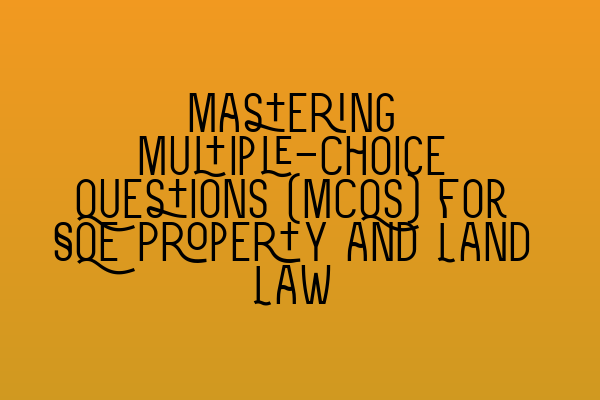Mastering Multiple-Choice Questions (MCQs) for SQE Property and Land Law
Welcome to the SQE Property Law & Land Law blog, where we aim to provide you with expert insights and guidance to help you succeed in your legal career. In this post, we will be delving into the world of multiple-choice questions (MCQs) and offering you tips on how to master them for the SQE Property and Land Law exams.
MCQs are an integral part of the SQE exams and mastering them is essential to ensure success. They are designed to test your knowledge and understanding of key legal principles, as well as your ability to apply those principles to practical scenarios.
Here are a few tips to help you tackle MCQs effectively:
1. Read the question carefully:
Before jumping into answering the question, take the time to read it carefully. Pay attention to details and ensure you understand what the question is asking you. Misreading a question can lead to selecting the wrong answer, so be sure to stay focused.
2. Identify the key concepts:
Once you have read the question, identify the key concepts or principles that it is testing. This will help you narrow down your focus and eliminate any irrelevant information. Understanding the core themes behind the question will allow you to approach it with a clear strategy.
3. Use the process of elimination:
MCQs often provide you with several answer options, including distractors that may seem plausible but are ultimately incorrect. Use the process of elimination to eliminate the answers that are obviously incorrect. This will increase your chances of selecting the correct answer.
4. Apply your knowledge and analyze the options:
With the remaining answer options, apply your knowledge of property law and land law to analyze each option. Consider the legal principles, statutes, and case law that may apply to the scenario presented in the question. This analysis will help you determine the most accurate answer.
5. Consider the context:
Often, MCQs are presented within a specific context. Pay attention to the facts and circumstances provided in the question. These details can provide crucial clues that will help you choose the correct answer. Take the time to consider how the context may impact the application of legal principles.
6. Practice with mock tests:
One of the best ways to prepare for MCQs is through practice. Our interactive SQE Mock Tests for Property and Land Law can test your knowledge and provide you with valuable feedback. These mock tests simulate the real exam environment, enabling you to familiarize yourself with the format and level of difficulty of the questions.
By mastering MCQs, you can improve your chances of achieving success in the SQE Property and Land Law exams. Regular practice and a clear understanding of the key legal principles and concepts will give you the confidence to tackle any question that comes your way.
To further enhance your knowledge in related legal topics, we recommend checking out the following articles:
– Understanding Contractual Capacity: Rights and Limitations
– Interactive SQE Mock Tests for Contract Law: Test Your Knowledge
– Join Our SQE Contract Law Webinars: Expert Insights and Guidance
– Contract Law Reforms: An Analysis of Recent Changes
– Parties in a Contract: Rights and Responsibilities
These articles will provide you with additional insights and guidance that will complement your study of the SQE Property and Land Law syllabus.
In conclusion, mastering MCQs is a critical skill that will greatly contribute to your success in the SQE Property and Land Law exams. By following the tips provided in this blog post, practicing regularly, and staying up to date with legal developments, you can confidently approach MCQs and demonstrate your knowledge and understanding of property and land law.
Stay tuned for more expert insights and guidance from SQE Property Law & Land Law. We wish you the best of luck in your studies and future legal career!
Do you have any other questions or topics you would like us to address in future blog posts? Let us know in the comments below.
